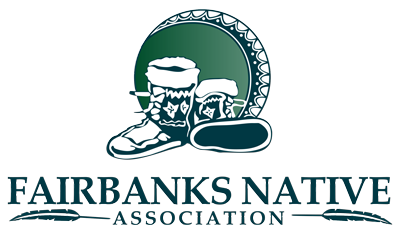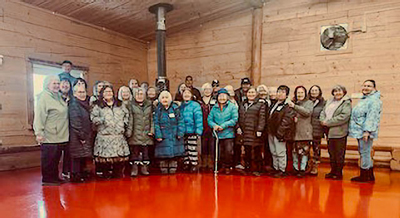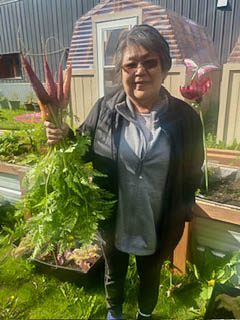Title VI Spotlight: Fairbanks Native Association
 On an early Tuesday morning at the end of February, in Interior Alaska, a day begins with no typical start and
end time. Karen Eddy, the Title VI director, starts her mornings at Fairbanks Native Association (FNA) with staff meetings to cover
tasks for the day. The time also allows her to make sure staff knows the importance of their work by drilling
home the word “compliance,” so that everyone is held accountable and a part of the success.
On an early Tuesday morning at the end of February, in Interior Alaska, a day begins with no typical start and
end time. Karen Eddy, the Title VI director, starts her mornings at Fairbanks Native Association (FNA) with staff meetings to cover
tasks for the day. The time also allows her to make sure staff knows the importance of their work by drilling
home the word “compliance,” so that everyone is held accountable and a part of the success.
Working at FNA brings challenges that make no two days the same. Karen's journey to FNA has been long, but it has allowed her to pick up skills and life lessons that guide her and make what she does even more meaningful. Her passion for the work drives everyone involved to meet the unique encounters each day brings.
In a typical week, Karen manages 14 grants, works with her team to improve the lives of Elders, and problem-solves with numerous partners to address immediate problems and plan for short- and long-term solutions. Most nights end the way the day started, with Karen making sure the Elders she works with are okay. Sometimes this includes checking on homeless populations to make sure that the elderly are not among them or on the streets.
A Diverse Population
 Alaska is home to around 229 federally recognized tribes. As Karen mentions, “Fairbanks is a hub,”
with many Native Elders in Fairbanks displaced. On any given day, staff at FNA may work with Native Elders from
Nome, Sitka, Kodiak, Dot Lake, or Mentasta, to name a few. As a result, she works with Native people from all
over the state, which creates unique challenges, but also rare opportunities.
Alaska is home to around 229 federally recognized tribes. As Karen mentions, “Fairbanks is a hub,”
with many Native Elders in Fairbanks displaced. On any given day, staff at FNA may work with Native Elders from
Nome, Sitka, Kodiak, Dot Lake, or Mentasta, to name a few. As a result, she works with Native people from all
over the state, which creates unique challenges, but also rare opportunities.
Each place has its own culture, language, and customs, allowing Elders to share language, foods, and knowledge with other people. Yet, with a diverse population being displaced, some Elders may need more than a warm meal. For instance, they may need to take part in classes from one of FNA's partners that educate Elders about their health and financial well-being, a place to socialize, or one of the many other events/programs that FNA offers each week.
No Single Response
With diversity, there is no one right response. Instead, Karen relies on honest, and sometimes, tough conversations with Elders. For example, over the past year, Elders were having trouble paying their rent. In some cases, they were eight months behind and facing eviction, in the middle of winter. As a result, Karen had to have very open and honest conversations with her Elders and everyone involved. While this situation could have resulted in hurt feelings, Karen makes it well-known to everyone that she is open, honest, and transparent, which leads to trust and positive outcomes.
Other times, conversations go a little easier when people are placed in talking circles and asked to share their thoughts. For example, an Elder who had not spoken in over eight years spoke in a talking circle because she felt heard and respected. Still, Karen is an Elder too and “stands proud of that.” It allows her to relate to Elders at FNA because they know she is listening to them and it gives her words more meaning as she may have gone through similar experiences.
COVID-19
Although COVID-19 is in the rearview mirror for most, at FNA, it continues to be tough to reflect on. Many Elders did not believe in immunization. As a result, Karen and her staff had to help bury over 200 Elders. In addition, while COVID-19 was ongoing, Elders experienced family violence, bullying, identity theft, and financial exploitation, among other hardships.
In worst-case situations, Elders experienced, “failure to thrive” – they had given up on life and lost the will to continue. This led to Karen and one of her partners, Linda Thai, a key figure who has partnered with Karen from the very beginning, to conduct five days of conversation with Elders in talking circles. These rich conversations helped FNA gain a deeper understanding of what Elders were experiencing daily. For example, many Elders did not understand what stress meant or even the type of victimization they were experiencing.
As a result of these conversations, Karen was able to partner with the National Crime Justice Training Center for three days of trainings and come together, work on concerns, and move forward in a good way while addressing the additional needs identified.
Partnerships, Collaborations, and “Other Duties as Assigned”
 For Karen and FNA, much of the success starts and ends with people working together for the best outcome.
Karen's staff have skill sets from many backgrounds, including cooking to social work to gardening to case
management, which she utilizes with the tag line on the application, “other duties as assigned.”
Other skill sets that enter FNA come from volunteers or their 31 partners.
For Karen and FNA, much of the success starts and ends with people working together for the best outcome.
Karen's staff have skill sets from many backgrounds, including cooking to social work to gardening to case
management, which she utilizes with the tag line on the application, “other duties as assigned.”
Other skill sets that enter FNA come from volunteers or their 31 partners.
This winter, some Elders were in danger of being displaced, but with the help of partners, they were able to resolve legal, accounting, and financial issues so that Elders would not be without a place in the middle of winter. Additionally, much of the health knowledge that Elders seek to learn comes from partnerships with the community and universities. For example, Dr. Ellen Lopez comes on most Saturdays to work with Elders by having natural conversations with them, as the Elders bead and sew. In addition, Dr. Lopez has been key to evaluating FNA's Title VI Program. In addition, Dr. Mary McManus works with FNA on public health issues and occasionally gets her students involved for hands on learning and additional assistance.
In the spring, FNA collaborates with more partners to plant gardens to make sure that food insecurity – one of the major concerns for Elders in Alaska – does not affect Elders in Fairbanks. One of these gardens is in the back of FNA and provides a spot for Elders to plant a garden and socialize with youth and volunteers that want to help throughout the year. Additionally, year-round local green houses will bring hundreds of pounds of vegetables for FNA to cook and feed Elders, but there is also enough for Elders to receive bags of food as well once they leave. In addition, Karen works with the state to distribute farmers market coupons to Elders, so they can seek other fresh foods.
Data Driven
FNA has been one of the Title VI programs at the forefront of collaborations and partnerships, which has led to success in many aspects. However, all of the collaborations and success are the result of Karen's programs taking a data driven approach to guide their responses. Some of the data she receives is quantitative, from surveys such as the Title VI Needs Assessment Survey distributed by the National Resource Center on Native American Aging (NRCNAA). Other times, it is gathered in qualitative form through talking circles at the end of the month when Elders are given the opportunity to voice their thoughts about the programs and what else they would like to see provided.
 Based on this feedback, Karen creates a month of activities for her Elders, which includes popular events like
crocheting circles and mentoring young children through activities like reading, playing music, and culture camp
were Elders help kids take part in seasonal events like dog mushing.
Based on this feedback, Karen creates a month of activities for her Elders, which includes popular events like
crocheting circles and mentoring young children through activities like reading, playing music, and culture camp
were Elders help kids take part in seasonal events like dog mushing.
In April, for Child Abuse Prevention Month, Elders are involved in singing, dancing, preparing traditional foods, and march through downtown Fairbanks to raise child abuse awareness in the community. During this event, Elders come from all over Alaska to take part in the event with their grandkids. On the next day, families take part in the Spring Fling in Fairbanks, which allows Elders to socialize with the community and/or be with their families.
Everyday Passion
In the fall of 2018, the NRCNAA visited FNA and Karen after attending a conference in Fairbanks. After that visit, everyone was struck by the number of programs and work that FNA did with Native Elders. While the work is challenging, it is often rewarding, and it takes a special person to take on this type of work.
When asked about what drives her to do this type of work, Karen replies, “One of the most rewarding things is making a difference in people's lives every day. When you are transparent, honest, and open – everybody blooms.”